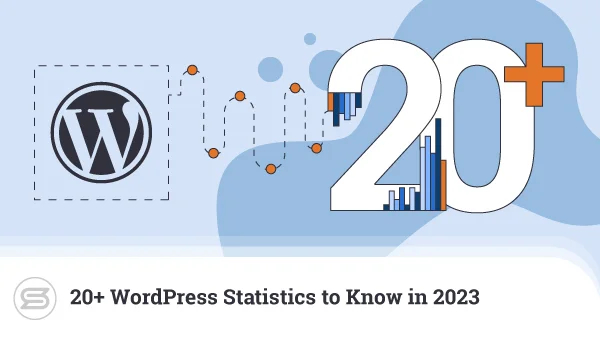If you’ve ever thought about building your website, chances are one of the first solutions you’ve heard about is WordPress. This is completely natural, given that this content management system (CMS) has been dominating its market for years now, holding over 40% of the industry share.
But that’s just scratching the surface.
WordPress powers 455+ million pages to date, with more than 500 new ones popping up every day. А whopping 17 blog posts appear per second from WP-built websites, and Google searches for terms containing “WordPress” easily exceed 37 million per month.
But what made this content management system so popular and well-preferred among the hundreds of other similar site-building tools?
The reasons are more than a few, but here is our top 10:
1. Absolutely free to use

Web hosting services might be getting increasingly more affordable, but you should still consider a solid budget, especially when planning to grow. Once your project starts getting more traffic and visitors, you have to keep up by ensuring more server resources, strengthening your security, and introducing new features.
All those things cost money, and the expenses quickly stack up.
To help you keep the budget balanced, WordPress is free to download and customize. Not only that, but thousands of themes and plugins developed for the CMS are also given away at no additional cost. Overall, WordPress is great if you’re just starting out and cannot afford a more custom solution.
2. Open-source architecture

WordPress is an open-source CMS which means its code is “unlocked,” and any developer can use it to customize the app, improve it with new feats, or create a helpful plugin. This has spawned a plethora of marketplaces for different WP products and services, guaranteeing you will always be able to find the add-on you need.
3. Wide variety of themes and plugins

When we say that WordPress offers countless themes and plugins to improve your website, we really mean it! The popular site-building app currently offers over 54,000 plugins and 11,000 themes, and those are just the options in their official marketplaces. Apart from them, the internet is booming with third-party templates and add-ons of all shapes and sizes.
IMPORTANT: ScalaHosting always recommends using WordPress-approved marketplaces (like Envato, ThemeForest and the official repository) for your plugins and themes. There is always a risk of problems and security vulnerabilities with untested add-ons from unknown sources.
4. Easy multipurpose websites

Back in 2003, when WordPress first came to the spotlight, it had a single goal – helping users easily create a blog website. WP started off as a fork for the b2/cafelog – a multi-blogging software that was already living its final days.
A few expected the evolution that WordPress has enjoyed ever since.
The app has grown to be a full-blown CMS packed with all kinds of in-built functionalities. With the right WordPress plugins, you can build practically any type of website – portfolio, ecommerce shop, news page, podcast, and, of course, all kinds of blogs. It’s no wonder that over a third of the top 1 million websites in the world is created with the help of WP.
5. Very SEO-friendly

No webmaster with ambitions to grow their project should underestimate the power of search engine optimization (SEO). This is the best way to attract visitors organically and with minimum investments. But convincing the search engines that your website is better than the rest is not an easy task without proper preparation.
Even without a dedicated SEO plugin, WordPress can help you out of the box. You can automate the creation of search engine friendly URLs, utilize H-tags, configure metadata – all that, without the need to learn any coding.
6. Scalability as you grow

It’s great if you can plan for the future – this way, you can allocate enough time and finances to steadily grow if everything goes according to plan. But that’s the thing – most often you can’t. Especially if you find a magic formula that doubles your visitors overnight.
WordPress is a great CMS in the sense that you can add and remove all kinds of plugins on the go, fulfilling the visitors’ needs at all times. A mom-and-pop shop needs to solve completely different problems than a large enterprise, but WordPress seems to hold all the answers.
IMPORTANT: Pairing up WP with a reliable VPS solution will help you scale your server resources (CPU, RAM, disk space) according to your usage.
7. Massive community

The open-source nature of WordPress has brought together a lot of loyal followers and freelance developers over the years. As its popularity grew – so did the fan base. WP today undoubtedly fancies one of the largest and most helpful communities out there, with thousands of forums, message boards, and events dedicated to the CMS.
If you are looking to gain more skills in building a WordPress website – you can take a pick between endless tutorials, guides, videos, and e-books. The content management system is still going strong today, so many other features and improvements are bound to come in the future.
8. Effortless content management

WordPress is an app that likes to cater to as wider an audience as possible. This means that even a novice user should be able to understand the basics and easily navigate through the interface.
WordPress is a content-focused CMS, giving you full control over what is posted on your website and when. You can add different authors and assign them with distinct administrative privileges.
In 2018, WordPress introduced an innovative block editor (Gutenberg) that unveiled even more opportunities for advanced content management.
9. No technical experience needed

Building a website can be a very technical operation which often requires business owners to hire experienced developers or webmasters instead of dealing with intricate code.
WordPress has none of that.
The popular CMS is easily comprehensible even for complete beginners. The app interface is quite intuitive, and many of the options are self-explanatory. Given that there is plenty of documentation and tutorials for users of all experience levels – WordPress is probably the best website building solution for novice self-learners.
10. Responsive on all screens

While web browsing was an activity mostly done on computers a mere decade ago, that is far from the case today. Smartphones, tablets, and all kinds of mobile devices have taken over our daily lives, and many businesses had to shift their focus to adapt.
WordPress devs have done a wonderful job in creating thousands of visually stunning themes, but the key feat that separates the best from the rest is mobile-responsiveness. Instead of creating different versions of your website to accommodate how it works on different screens – you can simply pick a fit-all WordPress template and save yourself precious time and effort.
Conclusion
As you can see, there are plenty of use cases where choosing WordPress is a no-brainer. The popular app is extremely versatile and easy to tailor to your specific business needs and goals. Even if you are not looking to monetize your project – WordPress can still help you create gorgeous-looking pages that make visitors want to come back.
FAQ
Q: Is WordPress losing popularity?
A: WordPress is still a long way ahead of other CMS solutions when it comes to market share. But is it still going strong nowadays? If we look at the growth in the last five years, we will see that WordPress has actually expanded its market share from 25.6% to 41%. Shopify is one of the solutions that also marked significant growth over that period (more than 3%), but other competitors like Joomla and Drupal even shrunk in size.
Q: What are the cons of using WordPress?
A: Enjoying so much popularity inevitably comes with some unwanted attention. In the case of WordPress, the software has become a favorite target for hackers, pushing webmasters to put a lot more effort into security. Another risk stems from WP’s rich plugin architecture.
It’s very easy for new users to go overboard with fancy add-ons, especially if they are looking to add tons of different functionalities. But piling on the plugins will just bloat your WordPress website and open new doorways for hacker attacks. Make sure to only keep a few essential add-ons and frequently clean old and unused ones.
Q: Does WordPress give you a domain name?
A: You can find WordPress in two different forms – a free-to-download, self-hosted solution on WordPress.org and a premium service onWordPress.com. The latter not only gives you the raw application package but includes the web hosting service, domain name, and professional support from the actual WP developers.



